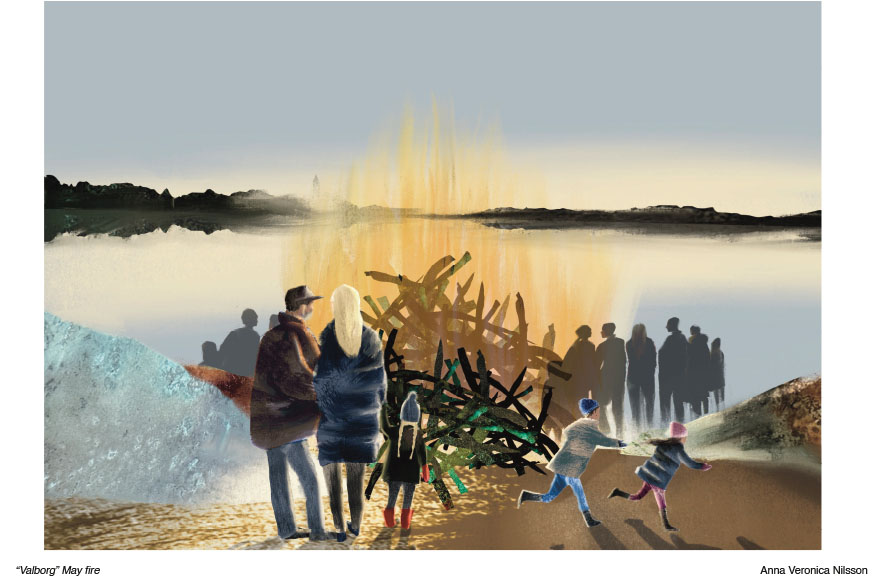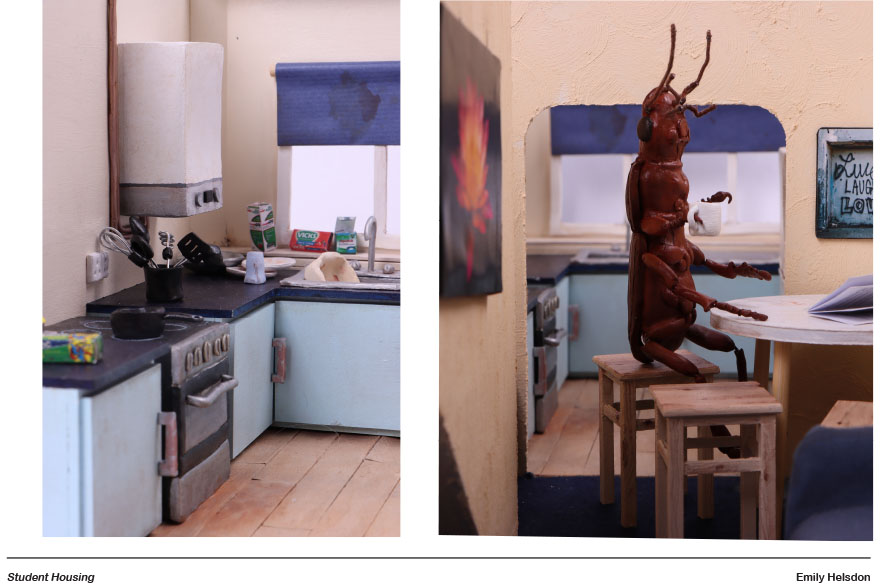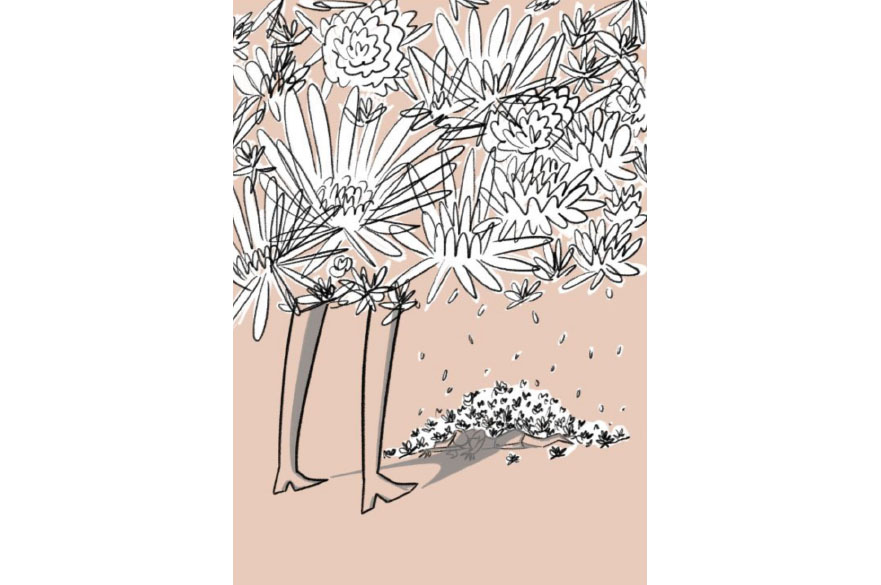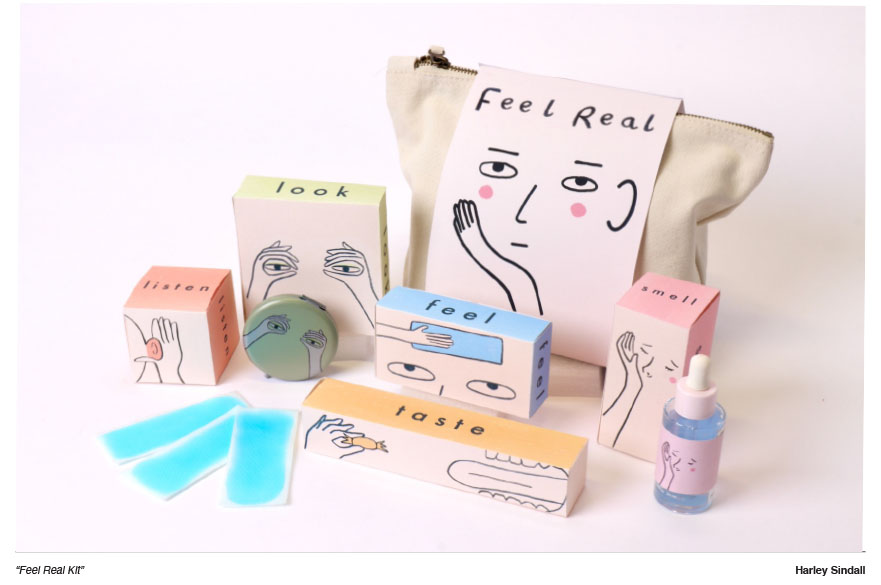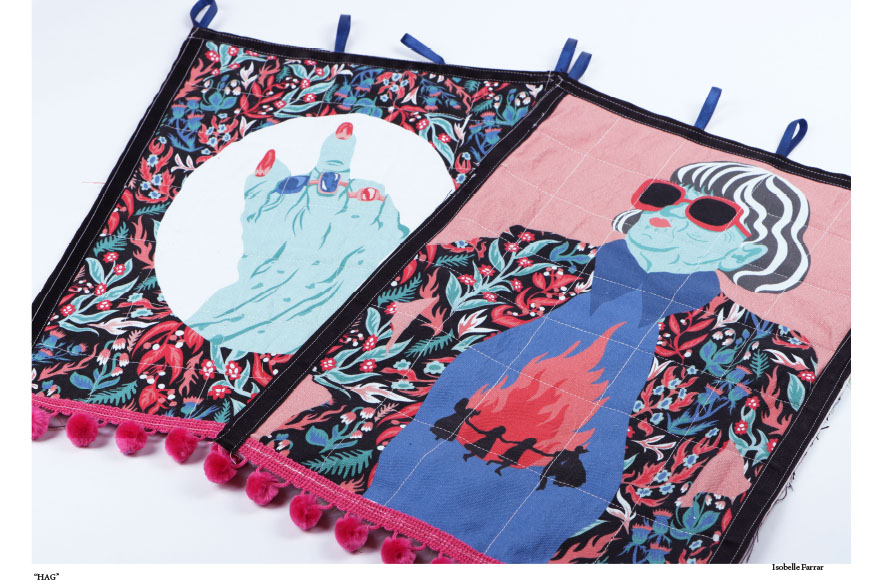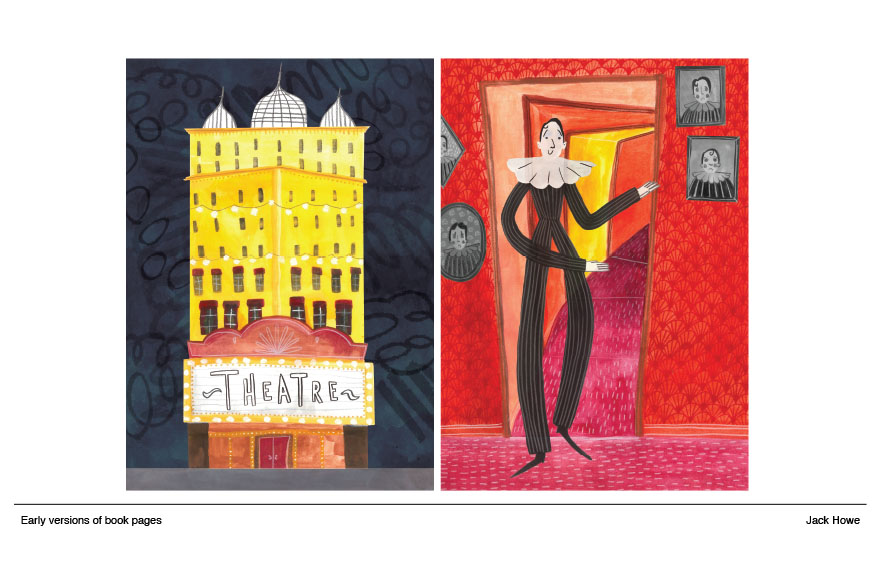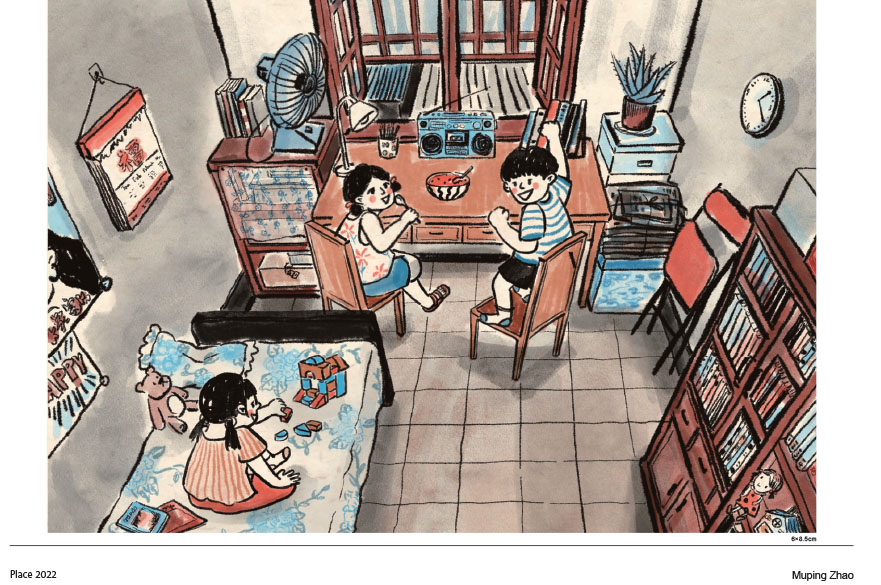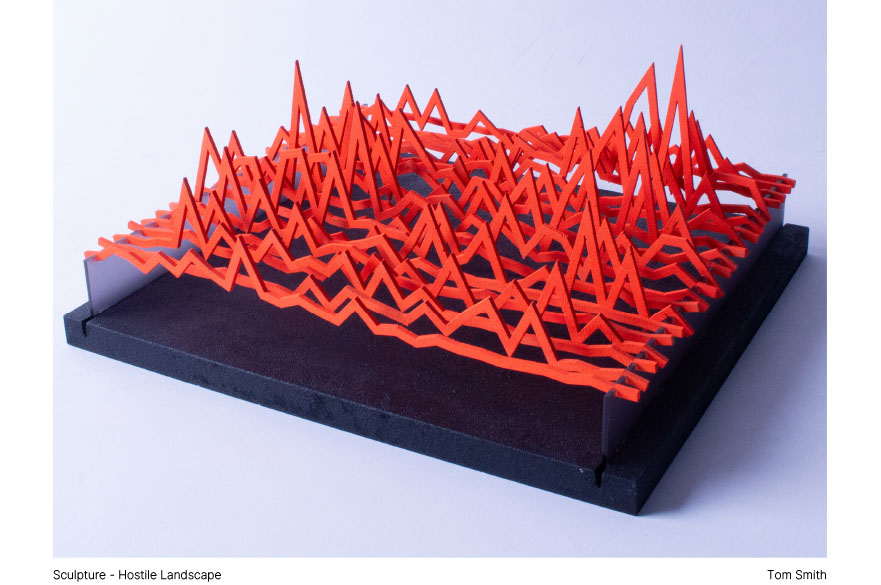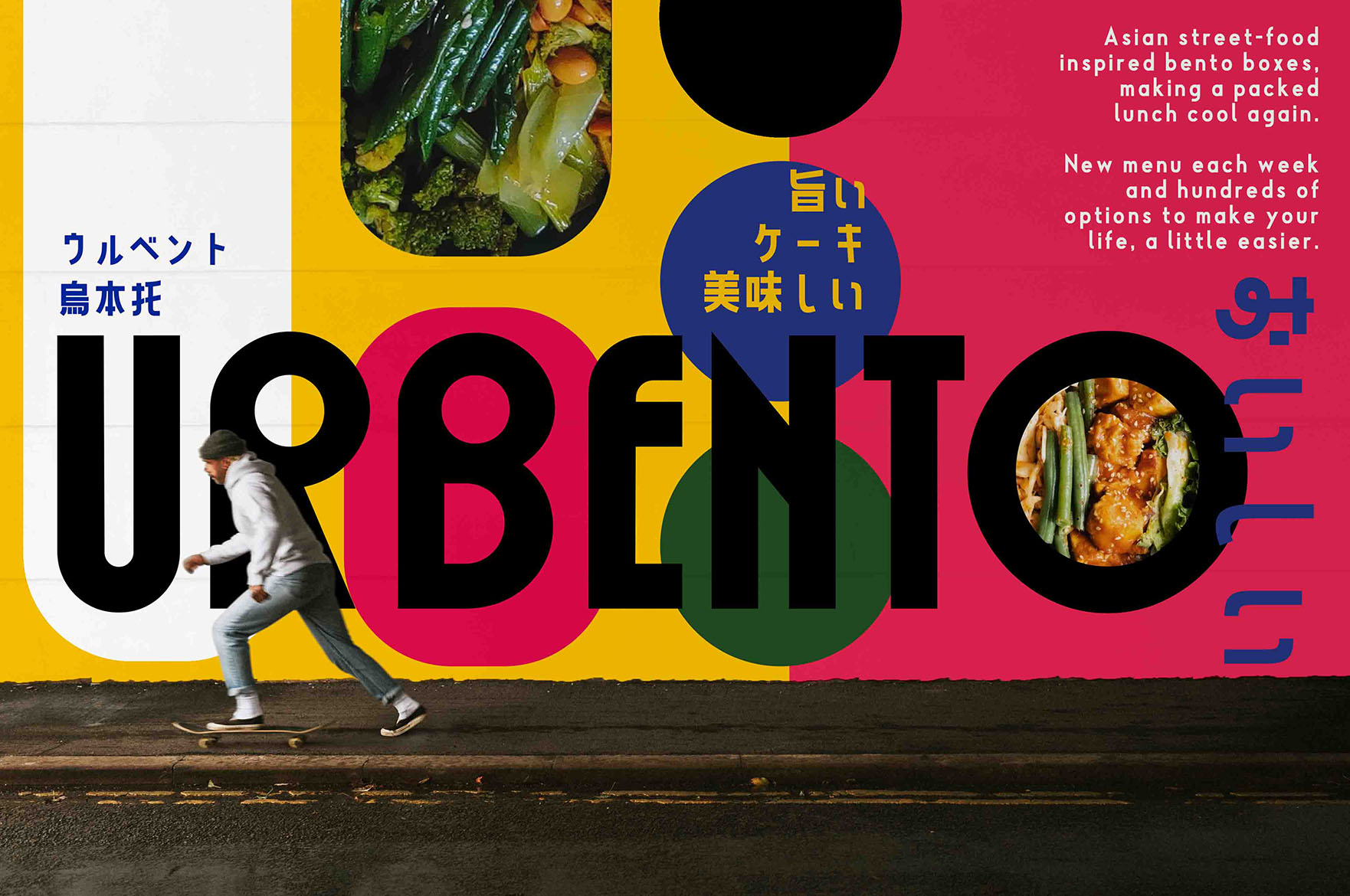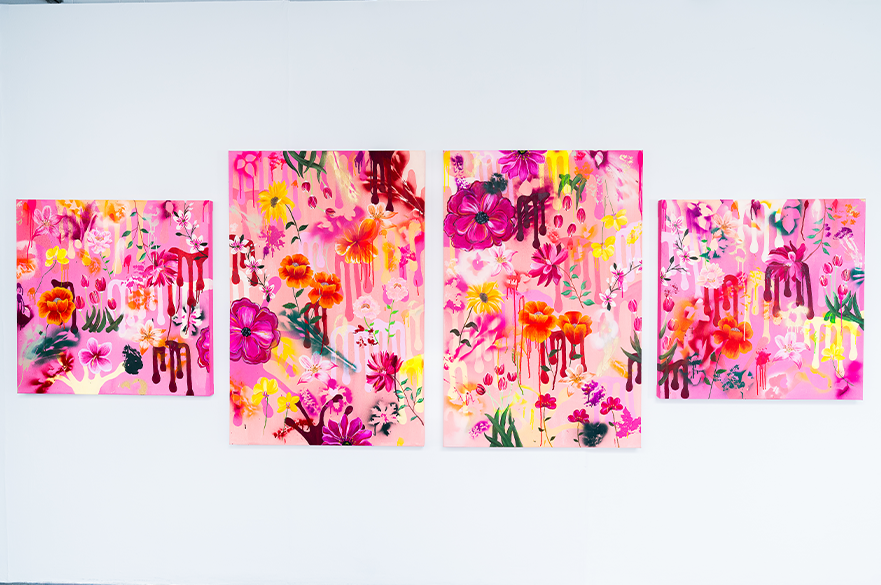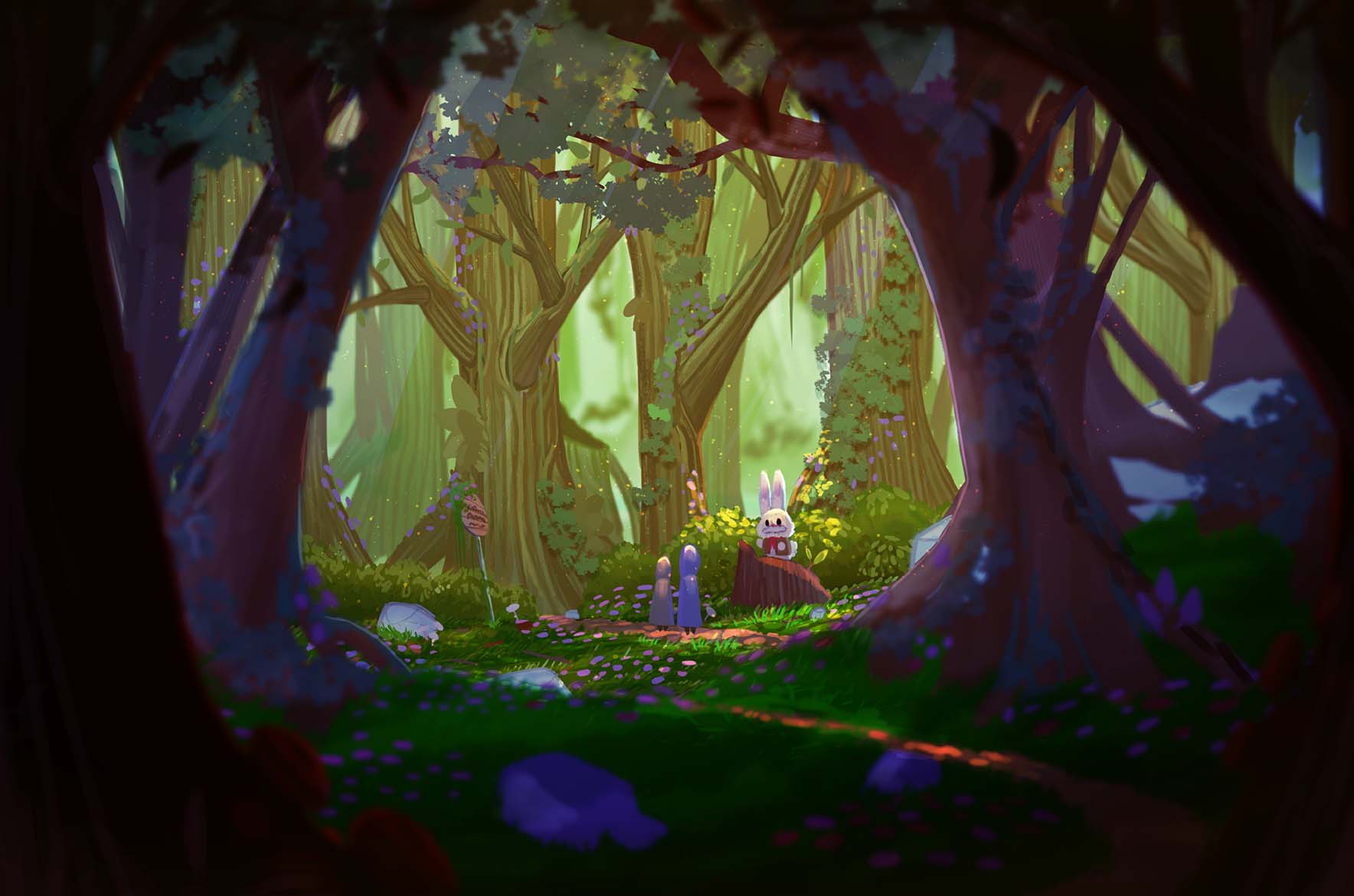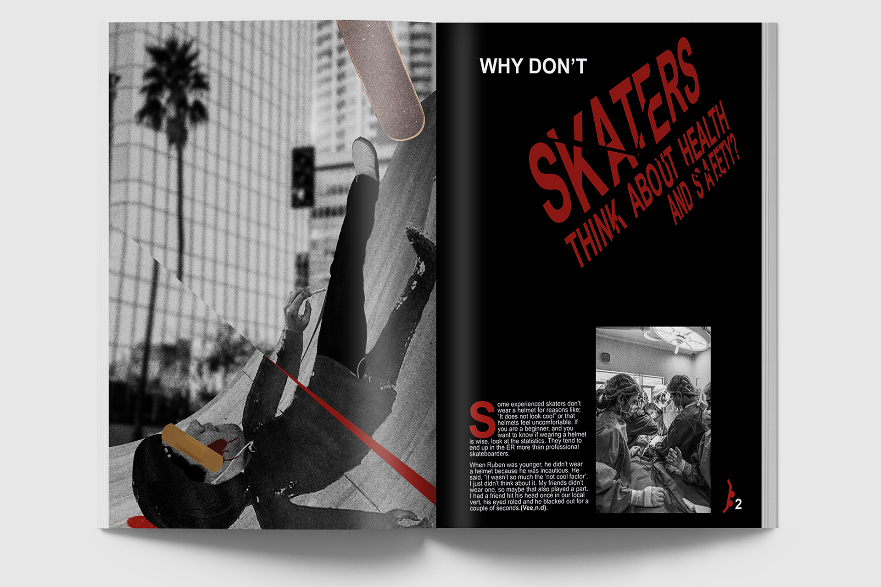This course is in Clearing
Offers from 80 tariff points
About this course
Enter the world of illustrative practice, embarking on a transformative journey to unearth your unique artistic voice as an illustrator. Graduating from this course means emerging as a highly refined visual communicator, adept at seamlessly blending craftsmanship and aesthetic prowess across various digital and analogue platforms, mediums, and projects. Your work will balance creativity with commercial acumen, incorporate sustainability, and be informed by a rich understanding of illustration's historical and cultural context.
In an ever-evolving industry, our mission is to equip you with the skills for a lifelong learning journey, ensuring you remain adaptable and prepared for the dynamic landscape of professional illustrative practice.
Main image by Ursjasvi Gandhi, BA (Hons) Illustration.
15
What you’ll study
You will develop a professional portfolio of work through independent, collaborative and industry-led briefs and projects and develop a range of professional skills that will serve you throughout your career.
There is an opportunity for students to undertake a placement year, and transfer to the Sandwich route, please see further details in the ‘Year Three’ section below.
Exploring Illustration
(100 credit points)
This module provides you with a dynamic exploration of the fundamentals of illustrative practice. During the first year you will explore observational and imaginative drawing and how they are applied to image making. You will be given opportunities to investigate methods and materials relating specifically to digital and analogue illustrative and graphic techniques. We will promote experimentation, playful approaches, reflection and critical evaluation in a studio setting.
You will also work collaboratively on projects to produce inspiring and creative outcomes and be introduced to how illustration is used in industry: how it is applied and how it appears in different contexts.
Ultimately, you will learn how to communicate your ideas visually using line, shape, texture, colour, form, type and image through a range of exciting projects, tutorials and workshops.
Illustration in Context
(20 credit points)
Explore key developments in the history of illustration, and examine illustration’s historical and cultural role in communicating and challenging ideas. You’ll study breakthroughs including print technology, the cultural significance of illustration in relation to protest, and key concepts including text/image relations, narrative sequence, visual storytelling, and modes of illustration.
These two year-long modules run side by side.
Professional Context and Personal Direction
(60 credit points, full year)
In Year Two you will focus on industry and developing a personal direction and visual identity which truly represents you as an illustrator. You will engage in a mixture of staff and live industry briefs which will introduce you to the professional world of illustration.. Technical workshops and seminars will develop your digital and analogue skills further alongside sessions focused on illustrative thinking, process and development that will sharpen your research and evaluation skills, allowing you to become confident in discussing a broad range of illustrative issues.
Contemporary Issues in Illustration
(20 credit points, full year)
Examine key issues in contemporary illustration, including illustration as communication; illustration as storytelling; and illustration and authenticity. These issues will be explored from the point of view of both narrative illustration (children’s books; comics; graphic novels; non-fiction) and applied illustration practices (editorial illustration; reportage illustration; scientific illustration; fashion illustration; environmental illustration; maker illustration eg. surface pattern and interiors). This module will also explore contemporary issues such as sustainability and ethical practice in illustration.
Co Lab: Research, Exploration and Risk-taking
(20 credit points, second half of the year)
Through active participation with team-based problem-solving, you will work together in mixed teams on a project where you will use your creative ideas to generate solutions to the challenge or brief. Your project will allow you to explore how creativity can make an impact in society, as you choose a theme of sustainability, social justice, enterprise and innovation or community. This collaborative learning experience will expose you to a range of new processes and approaches that will develop your creative thinking.
Optional module
You will also choose one optional 20-credit module from:
- Storyboarding
- Experimental Animation
- Publishing: Experimental Formats
- Telling Stories
- Exploring Creative Coding
- Drawing & Exploring with Natural Materials
- Ecological Futures: A Creative Response
- Prop Making
Optional Placement Year (Sandwich)*
We have an option for all of our students to undertake a placement year (Sandwich) and allow you to decide whether this is right for you once you have completed years 1 and 2 of your course. This time spent working in industry provides our students with crucial work experience, which is highly prized and much sought after by employers upon graduation. If you are successful in securing a placement you will have the chance to gain an additional Certificate or Diploma in Professional Practice, dependent on duration.
The additional placement year incurs a fee. For international students considering the transfer to the 4-yr SW route it’s important to seek advice from the International Student Support team and the Home Office regarding any potential visa implications and costs. For UK students, advice should also be sought regarding SLC eligibility, if applicable.
* If you choose to take the sandwich route option, you will still need to apply for this course with the full-time UCAS code: W220
Developing a Distinctive Professional Portfolio
(100 credit points)
By the end of this module you will have a bespoke personal portfolio that is aligned to your personal and professional goals. Your work will include briefs, both set and self-initiated, and may include competition briefs that have been set by established professional bodies, as well as ‘live’ client’ briefs set by partners and practitioners. Through research, reflection and analysis of your working process and others you will evidence intellectual, and connected, visual responses, and you will be confident with your own visual language, identity and aesthetic.
These areas of study combined will bring together your knowledge of the subject and industry, with your own creative vision to produce a highly considered professional body of illustrative work.
Independent Journal
(20 credit points)
The Independent Journal is a written and visual project that allows you to document and develop an understanding of your own creative practice in relation to the wider context of illustration theory, history, techniques, and ideas you have explored in previous modules.
These two year-long modules run side by side.
We regularly review and update our course content based on student and employer feedback, ensuring that all of our courses remain current and relevant. This may result in changes to module content or module availability in future years.
Don’t just take our word for it, hear from our students themselves
Student Work
Discover Illustration at NTU
How you're taught
Studio practice is a key element of this course, and you’ll spend a lot time in a creative studio environment. Teaching and learning experiences will include:
- studio activities
- peer groups
- lectures
- workshops
- seminars
- group tutorials.
You will also benefit from one-to-one surgeries, portfolio reviews, and self-initiated work experience.
Co Lab
Want real-world experience alongside your degree? Co Lab is your opportunity to work with peers from different disciplines on live projects set by industry partners. Embrace collaborative practice as you explore how creativity can make an impact in society and develop the skills employers want to see in the creative industries.
Exchange opportunities
If you’re thinking about studying part of your degree abroad, the course has exchange agreements with a number of institutions around the world.
Exchanges take place in Year Two of the course. You’ll receive guidance from the University about where you can study, and help in completing your application and arranging your exchange.
Showcase
You will be given the opportunity to exhibit your work during your time at NTU to members of the creative industries. Visit our ‘We Are Creatives’ showcase to take a look at the work of this year's graduating students’.
How you're assessed
Formative assessment points take place across the academic year. These are where you will receive an indication as to how your work is progressing in relation to the learning outcomes for the module. The final summative assessment occurs at the end of each module.
All portfolio work completed on BA (Hons) Illustration modules work will be assessed. Two key elements influence the assessment process on this course. The first is to recognise that effective illustration is produced through a process of research, analysis, development and evaluation. The focus of assessment is therefore on the entire process. This is reflected in the Course and Module Learning Outcomes and Assessment Criteria. The second is the immense value placed on reflective learning. Self-evaluation of your learning and development is therefore a regular aspect of tutorials and assessments. All sketchbook work that demonstrates the evolution and development of final idea presentation is required for assessment, they should also demonstrate the sequential and contextual nature of your learning.
Advice and feedback on your work and progress on projects is given at regular group tutorials, and also at formal review points during the module. This is called Formative feedback, and is designed to help you to understand the strengths and weaknesses of your work and what you can do to improve it.
All module assessments are based on course work, and there are no separate assessments such as examinations. At the end of each module you receive a mark together with summary feedback on your achievement. This is called Summative Feedback. You will be provided with written Summative Feedback on all of your module assessments (at the end, half or full year depending on your module schedule).
Careers and employability
From the very start of the course, you will be encouraged to identify with the world of work and your future beyond graduation. The course has a dedicated employability tutor and the School Employability team support Illustration students with drop-in session and advice.
This course will equip you with skills and experience needed to work as a professional illustrator, as well as a range of transferable skills that can be applied to a number of roles within the creative industries.
Connecting with industry
Our BA (Hons) Illustration course was created in consultation with leading industry bodies such as the Association of Illustrators (AOI), whose knowledge and expertise informs our approach and ensures that the course is aligned with the most current industry needs and expectations.
Some of our other industry connections, clients or partners include:
- Hachette
- Harper Collins
- Penguin Random House
- Usbourne
- Scholastic
- Folio Society
- Carmelite
- Nobrow Press
Throughout the course you will work with industry on live briefs and hear from visiting speakers. You will also be supported and encouraged to enter national and international illustration competitions such as The World Illustration Awards (AOI), The Batsford Prize, The Macmillan Prize, V&A Illustration Awards, and the YCN, Creative Conscience.
Creative Industries Federation
We are members of the Creative Industries Federation (CIF), which means students in the Nottingham School of Art & Design have the opportunity to sign up to free student membership. Creative Industries Federation are an organisation that represents, champions and supports the UK’s creative industries and membership grants students exclusive access to their selection of resources and events to help advance your career and connect with industry.
Showcase
You will be given the opportunity to exhibit your work during your time at NTU to members of the creative industries. Visit our ‘We Are Creatives’ showcase to take a look at the work of this year's graduating students’.
Campus and facilities
You’ll be based in our new Design & Digital Arts Building. Opening for 2024 admission, our new Design & Digital Arts Building will place Nottingham as a UK hub for film, television, animation, UX design, games design, graphic design and more.
You'll have access to industry-standard facilities which include a virtual production studio, an in-camera VFX studio and a black box studio, as well as collaborative studio spaces, future technology suites and exhibition spaces.
Entry requirements
This course is in Clearing
Looking for a place in Clearing? We are accepting application and would love to hear from you!
UK students
This course is in Clearing
Looking for a place in Clearing? We are accepting applications and would love to hear from you!
Clearing requirements
From 80 UCAS tariff points from up to 4 qualifications.
To discuss our entry requirements and see what we can offer you, call us now on +44 (0)115 848 6000. Alternatively, if you already have your qualifications, apply online via our Clearing Application form.
Preparing for results day? Beat the queue and sign up for NTU Priority for up-to-date information about all things Clearing. You’ll get an offer ahead of Clearing, subject to you achieving the required grades on results day.
Other requirements
To find out what qualifications have tariff points, please use our tariff calculator.
Additional requirements for UK students
There are no additional requirements for this course.
Contextual offers
If you don’t quite meet our entry requirements, we might be able to make you a lower offer based on a range of factors, including your background (such as where you live and the school or college you attended), your experiences and your individual circumstances (you may have been in care, for example). This is called a contextual offer, and we get data from UCAS to help make these decisions. We do this because we believe everyone with the potential to succeed at NTU should have the opportunity to do so, no matter what barriers you may face.
Meeting our entry requirements
Hundreds of qualifications in the UK have UCAS Tariff points attached to specific grades, including A-levels, BTECs, T Levels and many more. You can use your grades and points from up to four different qualifications to meet our criteria. Enter your predicted or achieved grades into our Tariff calculator to find out how many points your qualifications are worth.
Other qualifications and experience
NTU welcomes applications from students with non-standard qualifications and learning backgrounds, either for year one entry or for advanced standing beyond the start of a course into year 2 or beyond.
We consider study and/or credit achieved from a similar course at another institution (otherwise known as credit transfer), vocational and professional qualifications, and broader work or life experience.
Our Recognition of Prior Learning and Credit Transfer Policy outlines the process and options available for this route. If you wish to apply via Recognition of Prior Learning, please contact the central Admissions and Enquiries Team who will be able to support you through the process.
Getting in touch
If you need more help or information, get in touch through our enquiry form.
International students
This course is in Clearing
Looking for a place in Clearing? We are accepting applications and would love to hear from you!
Clearing requirements
From 80 UCAS tariff points from up to 4 qualifications.
To discuss our entry requirements and see what we can offer you, call us now on +44 (0)115 848 6000. Alternatively, if you already have your qualifications, apply online via our Clearing Application form.
Preparing for results day? Beat the queue and sign up for NTU Priority for up-to-date information about all things Clearing. You’ll get an offer ahead of Clearing, subject to you achieving the required grades on results day.
We accept equivalent qualifications from all over the world. Please check your international entry requirements by country.
Other requirements
English language requirements: See our English language requirements page for requirements for your subject and information on alternative tests and Pre-sessional English.
Additional requirements for international students
If you need help achieving the academic entry requirements, we offer a Foundation preparation course for this degree. The course is offered through our partner Nottingham Trent International College (NTIC) based on our City campus.
English language requirements
View our English language requirements for all courses, including alternative English language tests and country qualifications accepted by the University.
If you need help achieving the language requirements, we offer a Pre-Sessional English for Academic Purposes course on our City campus which is an intensive preparation course for academic study at NTU.
Other qualifications and experience
If you have the right level of qualifications, you may be able to start your Bachelors degree at NTU in year 2 or year 3. This is called ‘advanced standing’ entry and is decided on a case-by case basis after our assessment of your qualifications and experience.
You can view our Recognition of Prior Learning and Credit Transfer Policy which outlines the process and options available, such as recognising experiential learning and credit transfer.
Sign up for emails
Sign up to receive regular emails from the International Office. You'll hear about our news, scholarships and any upcoming events in your country with our expert regional teams.
Getting in touch
If you need advice about studying at NTU as an international student or how to apply, our international webpages are a great place to start. If you have any questions about your study options, your international qualifications, experience, grades or other results, please get in touch through our enquiry form. Our international teams are highly experienced in answering queries from students all over the world.
Policies
We strive to make our admissions procedures as fair and clear as possible. To find out more about how we make offers, visit our admissions policies page.

